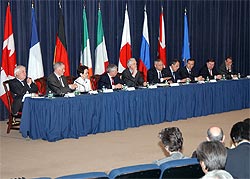G8 Foreign Ministers' Meeting
(Summary)
May 14, 2004

The G8 Foreign Ministers' Meeting was held on May 14, 2004, at the US Department of State (Washington D.C., United States of America). The Minister for Foreign Affairs Yoriko Kawaguchi attended the meeting. The chair's statement was not issued this year. Prior to the meeting, the G8 Foreign Ministers paid a brief courtesy call on President George W. Bush of the United States of America.
1. Greater Middle East Initiative
All G8 Foreign Ministers expressed common support for the US initiative for the G8 to assist political, economic and social reform in the countries of the region. Foreign Ministers agreed that such support should not be imposed from the outside, but respond to the reform initiatives of Arab countries while paying consideration to the diversity inherent in each country. G8 Foreign Ministers also agreed on the importance of earnestly tackling Middle East peace process and stability in Iraq in promoting the Greater Middle East Initiative.
2. Peace Operations Initiative
Foreign Ministers welcomed the initiative by the US to establish a mechanism to coordinate training for peacekeeping operations, establish a gendarmerie training center, and implement support for deployment and logistic activities of peacekeeping operations.
3. Regional Situation
(1) Iraq
Elements of UN Security Councils resolution on Iraq, which was now being deliberated, were mainly discussed in the face of handing over of the governing power to Iraq people at the end of June. Although no concrete agreement was reached, Foreign Minister dealt with issue in details such as contents of the authority of the transitional government and what the multinational military force should be.
(2) Middle East peace process
(a) All Foreign Ministers stated that the Israeli withdrawal from Gaza and parts of the West Bank as announced by Prime Minister Ariel Sharon should be undertaken in compliance with the Roadmap.
(b) Foreign Minister Kawaguchi stated that it was incumbent on the G8 to assist the Palestinian Authority, whose existence was in danger. Foreign Minister Kawaguchi announced the decision to implement financial assistance amounting to US$10 million (approximately 1.1 billion yen) through World Bank's West Bank and Gaza Financial Management Reform Trust Fund, which was highly evaluated by all countries.
(3) Afghanistan
Foreign Ministers agreed on the importance of ensuring the successful conclusion of presidential and parliamentary elections scheduled for September in Afghanistan and also of the restoration of security and tackling to the narcotics issue.
(4) Iran
(a) With regard to the nuclear issues, Foreign Ministers agreed that it is important for all countries to place pressure on Iran to fully comply with the agreement of the International Atomic Energy Agency (IAEA).
(b) Foreign Minister Kawaguchi introduced the results of Prime Minister's Special Envoy Masahiko Koumura's visit to Iran.
(5) North Korea
(a) Foreign Minister Kawaguchi stated that although the Six-Party Talks process was almost institutionalized, in the working group that had convened until May 14, differences with North Korea concerning the nuclear issue have yet to be overcome. Foreign Minister Kawaguchi announced that Japan would continue to demand nothing short of complete dismantlement of nuclear programs by North Korea. With regard to the abduction of Japanese nationals, Foreign Minister Kawaguchi requested the support and understanding of G8 colleagues in continuing efforts towards a resolution of the issue between Japan and North Korea.
(b) Foreign Minister Kawaguchi also announced that Prime Minister Junichiro Koizumi would be making a visit on 22nd May to North Korea for the purpose of achieving a comprehensive solution to existing problems including the nuclear issue and the abduction issue, and would be holding talks with General Secretary Kim Jong-Il.
(6) Situation in Darfur in Sudan
G8 Foreign Ministers expressed concern about the situation in the Darfur region of Sudan, where approximately one million internally displaced persons have appeared and approximately 100,000 refugees have fled to Chad, noting that a humanitarian crisis was occurring because, despite the fact ethnic cleansing was taking place, international humanitarian organizations could not enter the region due to militia activity. Foreign Ministers agreed on the necessity for a swift response by the UN Security Council.
(7) Others
The issue of polio in Nigeria was raised by the US, and the issue of the stabilization of Haiti was raised by Canada.
4. Reform of the United Nations
Noting that expectation for UN reform was rising, Foreign Minister Kawaguchi stated that the report of the High-Level Panel, the advisory institution to UN Secretary General Kofi Annan, is important and stated that the G8 should make joint efforts towards UN reform.
Back to Index
